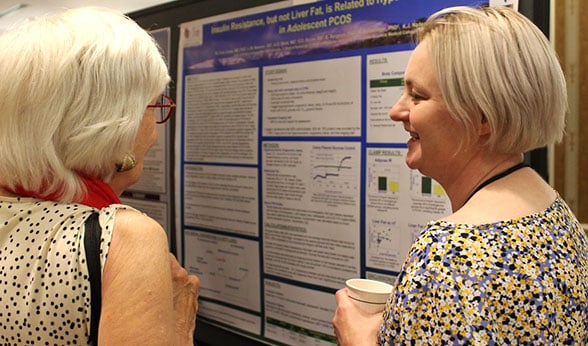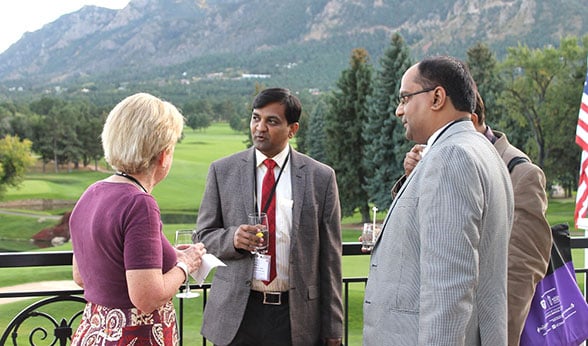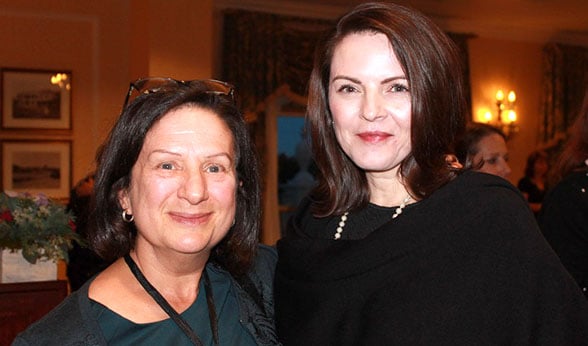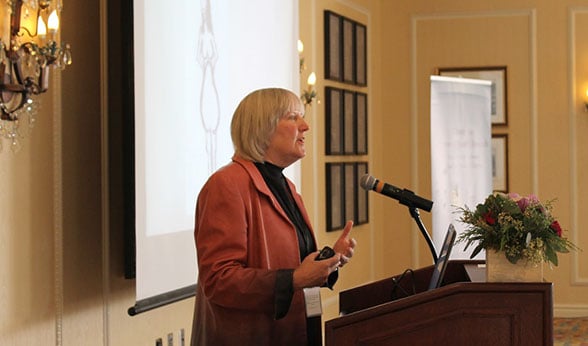Women and men are not equals when it comes to inclusion in medical research, from basic cell models to human clinical trials. Women have often not been included in numbers necessary to show how they differ from men in order to optimize the prevention, diagnosis and treatment of cardiovascular disease and diabetes, as well as other diseases.
The Center for Women’s Health Research (CWHR) at the University of Colorado Anschutz Medical Campus has worked to change that paradigm through its support of research and community education since 2004, and recently hosted its inaugural National Conference on Women’s Health and Sex Differences Research.
 CWHR researcher Melanie Cree Green, MD, PhD, discusses her poster on insulin resistance in girls with PCOS with Elizabeth Barrett-Connor, MD, a renowned women's health scientist from the University of California, San Diego School of Medicine.
CWHR researcher Melanie Cree Green, MD, PhD, discusses her poster on insulin resistance in girls with PCOS with Elizabeth Barrett-Connor, MD, a renowned women's health scientist from the University of California, San Diego School of Medicine.
“Sex Differences Across the Lifespan: A Focus on Metabolism” brought together leading researchers from across the country in the areas of women’s health and sex differences to share and discuss their latest findings. “The conference’s lifespan approach to disease research allowed for an exciting agenda, where sessions included Pregnancy-Related Determinants of Chronic Disease Later in Life, Implications of Sex Differences in Type 2 Diabetes Across the Lifespan, and The Effect of Life Transitions on the Risk for Obesity,” said CWHR Director Judy Regensteiner, PhD. “We were honored to collaborate with the University of Colorado Colorado Springs as well as the Society for Women’s Health Research to increase our impact locally and nationally.”
 CWHR Senior Faculty member Lorna Moore, PhD, talks with conference attendees.
CWHR Senior Faculty member Lorna Moore, PhD, talks with conference attendees.
The conference highlighted several next steps in the march forward of women’s health and sex-difference research. Marjorie Jenkins, MD, of the FDA Office of Women’s Health spoke about the FDA’s advances in drug testing in women. Jed Friedman, PhD, of CU Anschutz shared findings on how and why obesity might worsen the health and development of a pregnant mom’s baby. And Sherita Hill-Golden, MD, of Johns Hopkins University talked about why women with diabetes are more likely to have cardiovascular complications than their male counterparts.
 CWHR Director Judy Regensteiner, PhD, and Marjorie Jenkins, MD, Director of Medical Initiatives and Policy Advancement at the FDA Office of Women's Health.
CWHR Director Judy Regensteiner, PhD, and Marjorie Jenkins, MD, Director of Medical Initiatives and Policy Advancement at the FDA Office of Women's Health.
In addition to the scientific sessions, the conference included a breakfast and presentation by leading women’s health researcher, Wendy Kohrt, PhD, and business leader Ginger Graham, MBA, for community members who came to the conference including a group of members of the CWHR’s Advisory Board. “This conference goes beyond the research being shared between scientists – we wanted the community to benefit from and be a part of the interaction and next steps in sex-difference research. It is a way for us to honor those who helped make this conference possible, and to carry on our mission of community inclusion and education,” said Regensteiner.
“The community breakfast was spectacular; both speakers had everyone hanging on every word,” said Mary Sissel, longtime supporter and Board Chair emerita of the CWHR. Mary and her husband George, along with Judi and Joe Wagner, were instrumental in supporting the conference, and were proud to attend the event.
 Wendy Kohrt, PhD, CWHR Co-Associate Director and Nancy Anschutz Chair in Women's Health Research, speaks at the community breakfast.
Wendy Kohrt, PhD, CWHR Co-Associate Director and Nancy Anschutz Chair in Women's Health Research, speaks at the community breakfast.
Junior faculty scientists who are supported by the CWHR were invited to the conference to present their work in short “data blitz” sessions, which were very well received. In addition, the poster session interactions allowed them to build potential connections with established faculty.
This conference played an important role in contributing to the growing body of knowledge in women’s health and sex differences. Regensteiner is proud of the success, noting, “The new collaborations formed at this conference will shine a light on our priorities in this arena as we work toward a future in which every patient is treated according to evidence-based research that takes sex differences into account.”
The CWHR plans to hold its next national conference in 2018.
Guest contributor: Sarah Westmoreland, MPH, Public and Community Education Liaison, Center for Women’s Health Research




